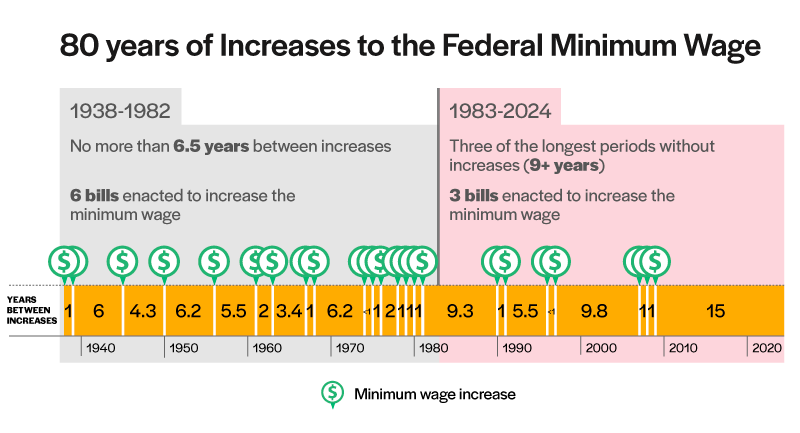
15 Years and Counting: Why We Can’t Afford to Ignore the Federal Minimum Wage Any Longer
The federal minimum wage’s 86-year history shows us that we used to know how to get this done.

Dēmos envisions an economy where all people can regularly meet their daily needs. This means all workers, particularly Black and brown workers, must earn a thriving wage. The Fair Labor Standards Act of 1938 (FLSA) established, among other protections, a federal minimum wage, setting a nationwide standard to protect workers from substandard wages. But the government’s continued failure to meaningfully update the federal minimum wage has left workers worse off.
July 24, 2024 marks 15 years since the federal minimum wage was last increased—the longest period without an increase in its 86-year history. Since 2009, the federal minimum wage has languished at $7.25 an hour, well below a livable wage in any part of the country.
For the first 40 years of the minimum wage, the federal government stepped up for workers.
It wasn’t always like this. For the first 40 years of the minimum wage, the federal government stepped up for workers. Increases were enacted regularly. Votes were bipartisan. Even when President Nixon vetoed an increase in 1973 amidst high inflation, he took issue only with the phase-in period, not the increase itself. He was clear on the need for urgent action, remarking, “There can be no doubt about the need for a higher minimum wage. Both fairness and decency require that we act now–this year–to raise the minimum wage rate. We cannot allow millions of America's low-income families to become the prime casualties of inflation.” The next year, Nixon signed legislation increasing the minimum wage.
But in the 1980s, as neoliberalism took root in U.S. economic policy, increases to the federal minimum wage happened less frequently. And with greater lengths of time without increases came the erosion of the purchasing power of the minimum wage, leaving more workers economically insecure.
In sending the FLSA to Congress and urging its passage, President Franklin D. Roosevelt remarked that “A self-supporting and self-respecting democracy can plead . . . no economic reason for chiseling worker's wages . . . ." This holds true today. Despite recent wage gains and state-level increases, people still report struggling with the high cost of living.
Our democracy cannot afford to leave a key lever for boosting wages and promoting economic security on the table.
Our democracy cannot afford to leave a key lever for boosting wages and promoting economic security on the table. According to analysis from the Economic Policy Institute, increasing the federal minimum wage to $17 by 2028 under the Raise the Wage Act of 2023 would boost wages for nearly 28 million workers—nearly half of whom would be workers of color.
Congress must end this shamefully long period of inaction. Congress must support workers and their families and pass the Raise the Wage Act of 2023 to finally increase the federal minimum wage.





